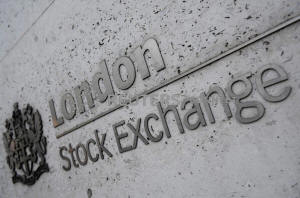|
Investors sell shares, shelter in bonds
before make-or-break trade talks
 Send a link to a friend
Send a link to a friend
 [May 08, 2019]
By Virginia Furness [May 08, 2019]
By Virginia Furness
LONDON (Reuters) - World shares tumbled
towards five-week lows on Wednesday as renewed trade tensions and
concern over the strength of the global economy drove investors to the
safety of bonds and the Japanese yen, with the latter hitting a six-week
high against the dollar.
Wall Street looked set to open sharply lower, with S&P 500 futures down
almost half a percent following Tuesday's steep falls, when
trade-sensitive industrial and technology sectors were slammed by fears
a potential U.S.-China trade deal could unravel.
Nasdaq and Dow Jones futures too were 0.3 percent to 0.5 percent lower.
Chinese Vice Premier Liu He is due to visit Washington on Thursday and
Friday for trade talks in a last-ditch bid to avert a sharp increase in
tariffs on Chinese goods ordered by U.S. President Donald Trump.
However, optimism over some kind of agreement was undermined after
Reuters quoted sources as saying Beijing had backtracked on most aspects
of the deal.

"I think it's a major risk that Trump raises tariffs," said Christophe
Barraud, chief strategist at brokerage Market Securities in Paris.
"If that happens we can imagine that negotiations will break down,
implying another few months of uncertainty... All in all, bonds as well
as other safe-havens such as yen, look set to benefit from this
situation in the short-term."
European shares slid 0.3 percent while MSCI's Asia-Pacific share index
excluding Japan was down almost 1 percent earlier to touch its lowest
level since late-March.
Colin Harte, head of research, multi asset solutions at BNP Paribas
Asset Management described the trade situation as a "quasi-Cold War."
"That was a jolt to the markets. The market assumed there was no serious
threat, and it suddenly woke up this week to find that the whole thing
could be derailed," Harte said.
Market jitters have been exacerbated by the mixed nature of recent
economic data from China as well as other big economies. Chinese trade
data showed solid imports but an unexpected fall in April exports. The
figures follow lackluster economic data in Europe, signs of steep
inventory build-ups in the United States and subdued manufacturing
surveys worldwide.
There was also bad news on the British front, where broadcaster ITV
reported Brexit talks between the two opposition parties were very close
to being terminated.

[to top of second column]
|

The London Stock Exchange Group offices are seen in the City of
London, Britain, December 29, 2017. REUTERS/Toby Melville/File Photo

That drove sterling half a percent lower while 10-year Gilt yields
dropped six basis points to 1.098 percent.
BONDS BENEFIT
Underscoring policymakers' fears for economic growth, New Zealand
cut interest rates, becoming the first country in the developed
world to do so since the Fed turned tail on policy earlier this
year.
The decision pushed the kiwi dollar to a six-month low, while
government bonds jumped, sending yields 5-7 basis points lower
across the curve.
"You can see why the reserve bank is easing rates, but how powerful
will that be?," Harte said. "The days of the central bank cavalry
riding to the rescue are over."
On currency markets, investors' demand for safe-havens boosted the
Japanese yen 0.2 percent against the dollar at 110.02 yen, taking
its gains to more than 1 percent this month.
Bonds too have benefited from the worries for growth and trade, with
10-year yields on U.S. Treasuries, German bunds and Japanese
government bonds (JGBs) falling to five-week lows.
Germany's 10-year government bond yield, the benchmark for the bloc,
hovered near five-week lows at -0.059 percent, not far from the
2-1/2 year low of -0.094 percent while Japan's 10-year yield
burrowed deeper into negative territory..
While the growth gloom pressured commodity markets, oil prices were
bolstered by the surge in Chinese crude imports as well as U.S.
sanctions on crude exporters Iran and Venezuela. Brent crude oil
futures held at $70.31 per barrel, 43 cents, or 0.6 percent above
their last close.

(Reporting by Virginia Furness and Sujata Rao; Editing by Andrew
Heavens and Hugh Lawson)
[© 2019 Thomson Reuters. All rights
reserved.]
Copyright 2019 Reuters. All rights reserved. This material may not be published,
broadcast, rewritten or redistributed.
Thompson Reuters is solely responsible for this content. |